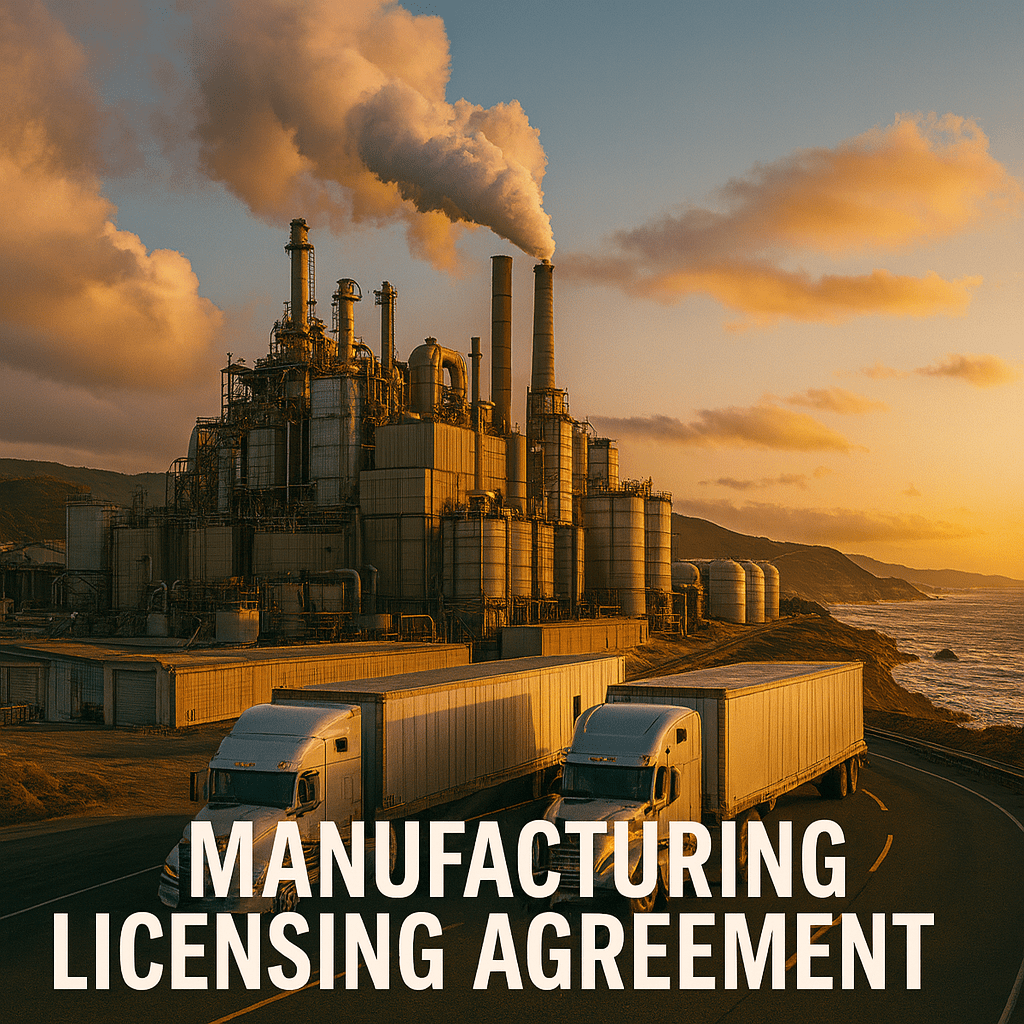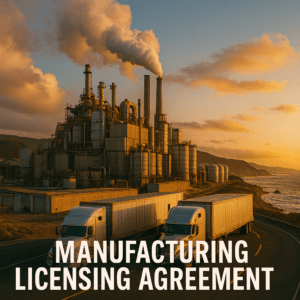Manufacturing and licensing agreements are essential legal tools for startups and consumer goods companies alike. Whether you’re launching a new wearable device, skincare product, or home fitness system, entering into a licensing agreement with a manufacturer can unlock scale—but only if your rights and obligations are clearly defined.
As one the top technology attorneys in the United States, I’ve helped countless founders draft, negotiate, and enforce manufacturing licensing agreements that are robust, enforceable, and aligned with investor expectations.
What Is a Manufacturing Licensing Agreement?
A manufacturing licensing agreement is a legally binding contract in which the owner of a product (the licensor) grants a manufacturer (the licensee) the right to produce that product. The licensor typically retains the intellectual property rights, while the licensee gains the right to manufacture, and sometimes distribute or sell, the licensed goods.
These agreements are particularly common in industries such as:
- Consumer electronics
- Beauty and wellness
- Fashion and apparel
- Toys and children’s products
- Food and beverage
But regardless of the industry, a poorly written contract can create existential risks.
Why Startups Use Licensing Instead of In-House Manufacturing
Manufacturing in-house requires enormous upfront capital, facilities, staffing, quality control, and supply chain management. For early-stage startups, outsourcing through licensing allows them to:
- Launch faster with lower capital expenditure
- Focus on brand, marketing, and distribution
- Avoid regulatory liability associated with manufacturing
- Tap into expertise and infrastructure of seasoned factories
However, this efficiency only pays off when the agreement clearly delineates responsibilities, ownership, and remedies.
What Key Terms Must Be in a Manufacturing Licensing Agreement?
Even the best manufacturer can become a liability without contractual safeguards. Your agreement should cover:
- Intellectual Property Ownership
Who owns the product design, trademarks, packaging artwork, formulations, or patents? The agreement must state that all IP remains with the licensor unless explicitly transferred. - Scope of License
Define what rights the manufacturer has: Is it exclusive? Limited to a territory? Does it include distribution? Time-limited? This prevents overreach. - Quality Control Standards
Set clear benchmarks for raw materials, product specs, QA testing, compliance with FDA or consumer safety rules. - Inspection and Audit Rights
Include the right to inspect manufacturing facilities and audit production records to ensure contractual compliance. - Termination Clauses
How can either party exit? What happens to unsold inventory, tooling, or proprietary molds? Include triggers for breach. - Indemnification and Liability
Ensure the manufacturer is liable for defects, regulatory fines, or third-party lawsuits stemming from production errors. - Dispute Resolution
Arbitration clause? Governing law? Venue? For California startups, ensure it reflects California law and courts.
 What Happens If You Skip the Legal Formalities?
What Happens If You Skip the Legal Formalities?
Without a written agreement, or with a template pulled from the internet, you risk:
- Losing control over your IP
- Being liable for injuries caused by defective products
- Getting locked into unfavorable pricing or exclusivity terms
- Facing customs issues when importing or exporting goods
California Considerations for Manufacturing Licensing Agreements
If you’re a California-based startup, be aware of:
- California Business & Professions Code §16600 et seq.: Covers licensing disclosures and fair dealing.
- Unfair Competition Law: Broadly interprets deceptive practices.
- Proposition 65: Requires warnings for chemicals in consumer products sold in California.
A properly tailored agreement can allocate responsibility for compliance with these rules.
Can You License Internationally?
Yes. Many startups work with manufacturers in China, Mexico, or the EU. But international licensing adds complexity:
- IP registration abroad may be necessary.
- Enforcement can be harder across jurisdictions.
- Import/export laws can create customs risks.
In such cases, dual agreements (e.g., master agreement + local jurisdiction addendum) or international arbitration clauses are common.
Q&A: Manufacturing Licensing Agreements
Do I need a lawyer to draft a manufacturing licensing agreement?
Yes. Boilerplate templates won’t protect you against product liability, IP theft, or contract disputes. An experienced attorney will tailor the agreement to your business and industry.
Can the manufacturer copy my product if I don’t have a patent?
Possibly. That’s why the agreement must contain strong confidentiality and non-compete clauses, and ideally be backed by trademarks or trade secrets.
Should I file a trademark or patent before licensing?
Ideally, yes. It strengthens your negotiating position and provides legal remedies if the manufacturer oversteps.
California Manufacturing Licensing Attorney
To protect your product, brand, and supply chain, every detail in your manufacturing licensing agreement matters. Schedule your confidential consultation now by visiting L.A. Tech and Media Law Firm or using our secure contact form.
David Nima Sharifi, Esq., founder of the L.A. Tech and Media Law Firm, is a nationally recognized IP and technology attorney with decades of experience in M&A transactions, startup structuring, and high-stakes intellectual property protection, focused on digital assets and tech innovation. Quoted in the Wall Street Journal and recognized among the Top 30 New Media and E-Commerce Attorneys by the Los Angeles Business Journal, David regularly advises founders, investors, and acquirers on the legal infrastructure of innovation.
Schedule your confidential consultation now by visiting L.A. Tech and Media Law Firm or using our secure contact form.



